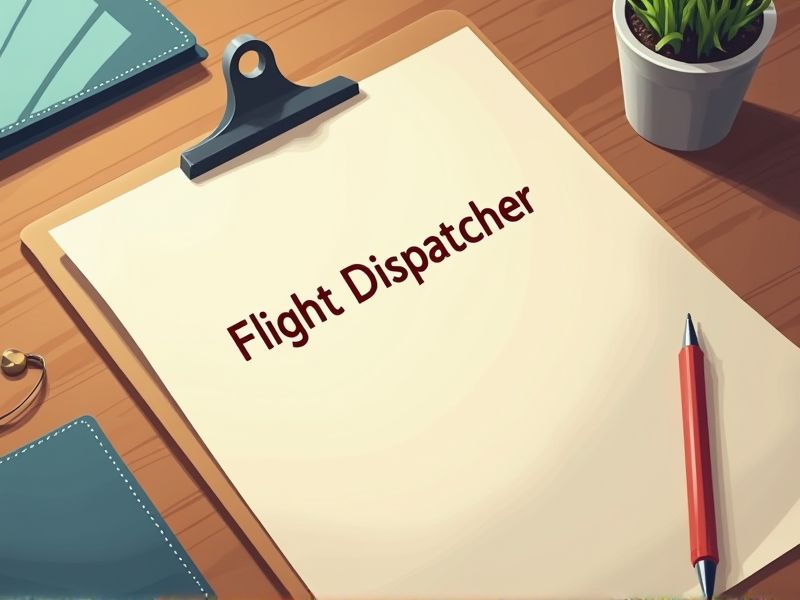
Flight dispatchers play a critical role in aviation by ensuring that every flight operates with safety and efficiency. To manage flight routes, weather conditions, and regulatory compliance effectively, dispatchers must possess specialized knowledge and skills. Certifications verify their proficiency and understanding of industry regulations, equipping them to make crucial decisions in dynamic environments. These are some important certifications you may need as a Flight Dispatcher.
FAA Aircraft Dispatcher Certification
The FAA Aircraft Dispatcher Certification ensures that flight dispatchers have the necessary skills to safely coordinate flight operations, impacting airline safety protocols. This certification verifies a comprehensive understanding of weather patterns, aircraft performance, and federal air regulations, crucial for effective flight planning. Airlines require certified dispatchers to enhance operational efficiency and minimize risks, reflecting regulatory compliance. This certification instills confidence and trust among passengers and crew, reducing mismanagement during flight operations.
ICAO Flight Dispatcher Course Certification
The ICAO Flight Dispatcher Course Certification ensures that flight dispatchers have the necessary theoretical knowledge and practical skills to perform their duties effectively, which enhances overall flight safety. Regulatory bodies and airlines require this certification because it aligns with international aviation standards, ensuring consistent operational practices. As the aviation industry expands, certified flight dispatchers become crucial for managing complex flight operations efficiently. Certification also opens career advancement opportunities, as it is recognized worldwide and often a prerequisite for higher positions in flight operations.
Transport Canada Flight Dispatcher Certification
The Transport Canada Flight Dispatcher Certification ensures that flight dispatchers possess the required knowledge and skills to manage and oversee crucial aspects of flight operations, enhancing aviation safety. This certification mandates a comprehensive understanding of aviation regulations, air traffic management, and weather patterns, which are vital for making sound operational decisions. Flight dispatchers with this certification effectively coordinate and communicate with pilots and ground crew, contributing to efficient and safe travel. The certification also aligns with industry standards, promoting global recognition and employment opportunities for those holding the credential.
EASA Flight Dispatcher Certification
EASA Flight Dispatcher Certification is necessary because it ensures that dispatchers are trained to international safety and operational standards. This certification provides dispatchers with the skills to handle complex variables such as weather conditions and air traffic coordination. Airlines rely on certified dispatchers to minimize risks and optimize flight planning efficiently. Regulatory compliance with EASA enhances the airline's credibility and trust.
IATA Flight Operations Management Certification
The IATA Flight Operations Management Certification ensures that a Flight Dispatcher possesses comprehensive knowledge of international aviation standards, enhancing overall safety and compliance. Certification equips dispatchers with the skills to efficiently plan and monitor flight operations, optimizing fuel usage and reducing operational costs. It validates the dispatcher's ability to handle emergency scenarios, ensuring timely and effective decision-making under pressure. Employers view this certification as an indicator of professional commitment, potentially leading to better career opportunities for the individual.
Aviation Weather Forecasting Certification
Aviation Weather Forecasting Certification equips flight dispatchers with the necessary skills to interpret and analyze meteorological data accurately. Understanding weather patterns directly affects flight safety and efficiency, as dispatchers can make informed decisions regarding routes and alternate plans. The certification ensures compliance with aviation regulations, mandating standardized knowledge across the industry. Flight dispatchers with this certification contribute to reduced delays and enhanced safety, as they possess a clear understanding of potential weather-related hazards.
Operational Safety and Risk Management Certification
Operational Safety and Risk Management Certification is essential for flight dispatchers as it ensures they have a comprehensive understanding of aviation safety regulations, which reduces the risk of incidents. This certification equips dispatchers with the skills to assess and mitigate potential hazards, leading to safer flight operations. Airlines require certified dispatchers to meet industry standards, enhancing both compliance and accountability. With proper risk management training, dispatchers contribute to more efficient and reliable air traffic management.
Emergency Response Planning Certification
Emergency response planning certification equips flight dispatchers with essential skills to manage crises, reducing response time during unexpected situations. Proper training enhances decision-making capabilities, which directly impacts passenger and crew safety. Regulatory compliance ensures airlines adhere to safety standards, minimizing legal and financial risks. Certification fosters a culture of preparedness, promoting a proactive approach to potential emergencies in aviation.
Crew Resource Management (CRM) Certification
Crew Resource Management (CRM) Certification enhances a flight dispatcher's ability to effectively communicate and collaborate with the flight crew, directly impacting flight safety. When flight dispatchers are CRM certified, they demonstrate improved decision-making skills in high-pressure scenarios. CRM Certification equips dispatchers with the tools to manage human error by fostering situational awareness and team coordination. The Federal Aviation Administration mandates CRM training, highlighting its importance in maintaining operational safety and compliance in aviation industries.
Aviation Security Management Certification
Aviation Security Management Certification equips a flight dispatcher with crucial knowledge to handle security threats, enhancing overall flight safety. Regulatory bodies often require this certification to ensure dispatchers are compliant with national and international security standards. Heightened sensitivity to potential security risks allows flight dispatchers to make informed decisions quickly, reducing the risk of incidents. Passengers and crew benefit from increased confidence in flight operations, knowing a certified professional is overseeing security protocols.
Summary
By obtaining certifications, you gain enhanced skills and credibility in the field of flight operations. This can lead to increased job opportunities and potentially higher earnings. Employers tend to prefer certified professionals, ensuring a competitive edge in the job market. The increased knowledge from certifications also contributes to safer and more efficient flight operations.
